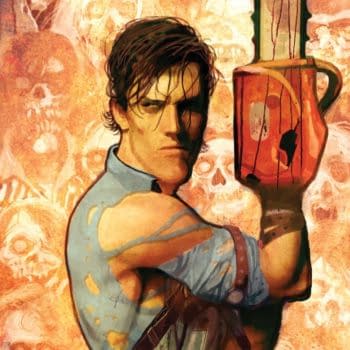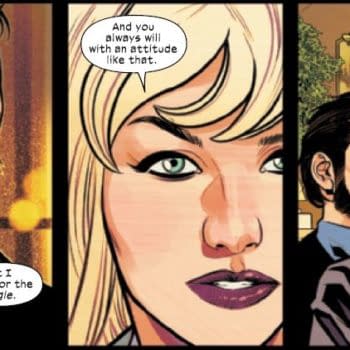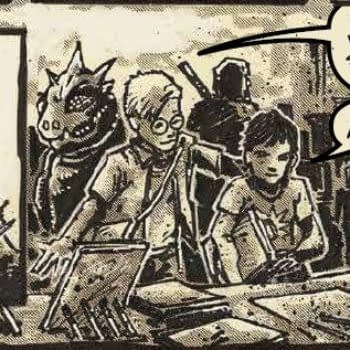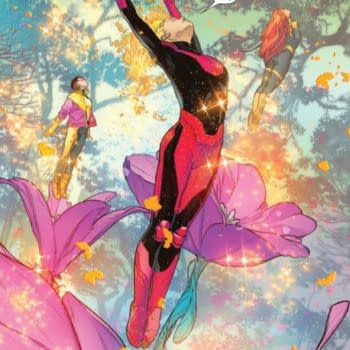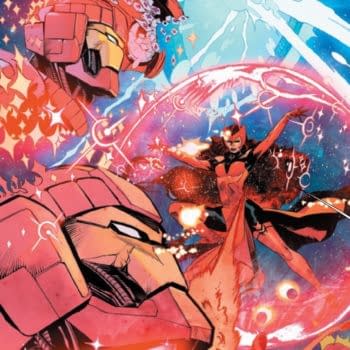Posted in: Comics | Tagged: Babs Tarr, batgirl, Batman, becky cloonan, Brenden Fletcher, cameron stewart, Comics, dc comics, entertainment, gotham academy, gotham by midnight, scott snyder, Thought Bubble 2014
Gotham Descends On Leeds At Thought Bubble: Scott Snyder, Becky Cloonan, Cameron Stewart, Brenden Fletcher, And Babs Tarr Talk About Their Bat Community
For the Spotlight on Gotham panel at Thought Bubble on Sunday, November 16th, the Festival had a remarkable line up of talent in attendance to talk about the most forward-thinking and innovative things happening in Gotham at the moment. Scott Snyder, Becky Cloonan, Cameron Stewart, Brenden Fletcher and Babs Tarr squeezed into a packed concrete and glass walled event room on Sunday to talk to fans, and each other about their work on Batman, Gotham Academy, and Batgirl and the sense of community at the center of their work.
Regarding the inception of the Stewart, Fletcher, and Tarr team up for Batgirl, Stewart explained that he had seen Tarr's artwork "years ago" online and contacted editor Mark Doyle eventually, asking if there was any way to work on the project together. For him it was a "pie in the sky" request and something he didn't expect would happen easily. Stewart said he had the first version of the design for Batgirl's new costume in mind, including snaps and boots, and sent that to Tarr, and her response was that the design was "cool" but she could make it "cooler" by adding detail. Her contributions were the collar and jacket designs particularly.
When the Batgirl team were asked what they felt people were most responding to about the book, Tarr said that the book has simply come along at the "right time" and that as a female reader, she knew she wanted a different "tone" of book, one that she could "relate to" and, of course, a fashionable outfit. Stewart added that the current "conversation in comics is becoming more inclusive for female readers" and even the title "Batgirl", with an emphasis on "girl" is important, and that he feels there is a "hunger" for this type of book out there. Stewart feels that it's also important to portray her as 21 years old, versus older interpretations of her story that have existed. He hopes to present the "honest trials" of that age when one is "not really an adult yet". Because she learned to struggle early in life with disability, she has missed out on many of the social aspects of her age, and especially hasn't had an active social life—until now. Fletcher said that Barbara wants very much to "integrate" with young people but doesn't have the social skills to do that and particularly doesn't know how to balance her social life with her "bat life" yet.
It turns out that, according to the panelists, the series Gotham Academy very much started life in the "same studio" as Batgirl. Cloonan performed quite a dramatic and funny narrative for the audience of what happened in the studio on the day that Gotham Academy got its start, from a phone call she received from Doyle, who called her looking for "new titles", to her out-loud recruiting of the other members of her team while they were within earshot reacting with incredulity at the things she was saying to Doyle. She shushed them as they tried to interrupt her while she signed up Fletcher as her co-writer and Karl Kerschl as artist on the book. Finally hanging up the phone, she explained the book to everyone and it turned into quite an "organic idea". Cloonan feels that not only is the story "fun" and one she would've liked to read as a kid, but that they've made the right decisions on the book and produced a story that "everybody gets on some level". Doyle responded very favorably to the full pitch while others at DC were asking "What are you doing?" and didn't exactly have a handle on how to market or promote the book due it its young adult elements. Stewart interrupted with a pithy summary of, "Harry Potter + Batman = Dollars", to much audience laughter.
Cloonan added that for her the series is more like "Harry Potter plus Batman: The Animated Series and Scooby Doo", but there are other influences as well. The story, Cloonan said, exists in a kind of "safe bubble" within the Gotham universe, but also within continuity so that it has the "whole Batman mythology to pull from". Stewart remarked that the two books: Batgirl and Gotham Academy, are "close together" in many ways and have similar "goals", making them almost "sister books", and "crossovers" will be "more apparent in 30 days' time", Fletcher added.
Moving onto a discussion of Scott Snyder's role in the Gotham universe, Cloonan said that Snyder's work "fits totally with what we are doing since there are things about Gotham that even Batman doesn't know", and she cited Snyder's Batman and Gates of Gotham as titles she referred to in her pitch for Gotham Academy. Snyder said that for him, when he hears talk about the success of Batgirl and Gotham Academy, his reaction is that calling the books "young" and "stylish" may be true but it also "sells short the fact" that they are also "incredibly authentic stories" with a passion behind them that ties into a "bigger zeitgeist" because the books have people with creator-owned comics experience on the team.
Snyder feels that they have brought that passion and energy from creator-owned comics over to DC and preserved that excitement of their own studio. He's very impressed by "how genuine they are". "These guys come in and raise the bar on books that matter to them and not necessarily conventional batbooks. It's a hugely thrilling thing", Snyder said. These books are "irreverent" and "challenge readers and creators", he said, and show that the "more we can try, the more we can do", he said, thanking the other panelists for their work.
Snyder referred back to his early work on Batman as a time when he was overly "scared" and cautious in what he was writing, thinking he'd be "kicked out of Gotham". He took the approach that he only had one shot to make his mark and wrote to that challenge, but now that he's had a measure of success, he feels a welcome sense of being more relaxed and engaging with the possibilities of "longer form storytelling".
Now he can "come back to the present and build things", he said, and readers will soon see the difference in new supporting cast members. When he was asked if he feels "tired" now after all his hard work on Bat titles, he said that he doesn't feel tired at all, but a little "bewildered" that he's been allowed and able to do so many issues. Snyder wants to "challenge himself" by "structuring the book differently" on Batman, and in January coming up, he hopes that he, Cloonan, Fletcher, Stewart, and Tarr can have a "bat summit" to share ideas and plan things together. He's spent a long time trying to run his work on Batman "monolithically" so as not to intrude on the work of other creators, but many of these creators are also his friends and to some extent they have the desire to "play alongside each other" in the Bat universe, where they work with "plenty of room" but also in a "shared city" of Gotham.
Snyder said that though his "one chance" approach worked well for him in things like Zero Year, making sure he was crafting his "opus" out of respect for the chance he was being given, now he's "revising" that intense approach and hopes to do more "world building". He compared his goals to the achievements of Batman: The Animated Series, that was more of a "slow burn" in narrative. He feels he will never "top" himself now on a personal level concerning his work on Batman, so he'd now like to "have fun" exploring new things.
The panelists were asked if artists ask to draw what they want to draw and how that affects the scripting of the writers on these books. Fletcher said that Tarr occasionally asks to draw certain things and he's happy to make changes to include that. Snyder said that Greg Capullo is very "macho" about it, asking to add more tanks, which raised some laughter from the audience, but Snyder clarified that he basically tells Capullo the story he has in mind and asks for input before writing the script. There's then a "back and forth" as Snyder writes it and they've found a way that "works" for them, though processes are different for every creative team.
The conversation among panels then became even more humorous when they discussed drawing nudity or attractive characters in their work. Tarr said that once she drew a "cute butt" and then got the pages back to see that a "bubble" had been placed, concealing her work, which was a "waste" so she "called it out" and asked that the bubble be moved. Snyder commented that butt shots are all the rage in Grayson, and Tarr observantly pointed out that Grayson can be a "slut" and "everyone loves it", but when a female hero like Batgirl even "makes out" with someone, it raises eyebrows. The panelists suggested they come up with a new term, "Gotham Sexual" to spread equality.
Snyder said that the biggest ideas he's playing with at the moment regard the characterization of Bruce Wayne versus his Batman identity. He finds that Wayne is just as "pathological" in his obsession with doing good in Gotham as Batman is in his own mission. He wants to know "who the man in the middle is" between those two identities.
When asked why Bruce Wayne never has "romantic relationships" his comics, Snyder replied that as a reader, he never felt much of a response to those elements because you "know how it's going to end". "I know him", he said, and it's as if the character's mindset is, "I know what makes me happy in life. It might be self-destructiveness, but I'm not going to change". And of course, that means that relationships fail. Things may change a little come June, Snyder teased, since he's trying to look at "Bruce Wayne of Gotham", as a part of his city. He does have "deep relationships with his supporting cast, though", Snyder said.
When the panelists were asked how involved DC Comics is in trying to keep continuity in line in their books, Fletcher said there's been very little or none of that for him so far, and things at DC are "different now than they were 5 years ago". It's been a "dream", wherein he feels, "We get to tell our story unencumbered". Stewart said it's also true that these books can only really work if they are "self-contained" anyway, at least for their first year. There are proposed crossovers sent their way, but it's always a matter of choice as to whether they want to take part.
Snyder added that there is an opportunity coming up for all of them to crossover more easily regarding "Joker stuff", but they are considering "trying something new" with crossovers wherein they act "outside the main stories as one-shots" which might work better. Mark Doyle has been very laid back about crossovers with these teams, apparently, saying it's "no big deal", and up to them if they want to be involved. Everyone agrees that it's important that readers be able to read the books independently and understand them without having to read all the others to enjoy them singly.
Stewart explained that sometimes it feels like there's no "entry point" to long running books or to the DC universe, but that Batgirl certainly "is" one of those entry points for readers. When an audience member asked if the differences in genres might make crossovers difficulty for these books, Fletcher said that you can "find an angle on it" and there can be "ripples" as part of a crossover versus main storyline changes. The most important thing is to remain "tonally consistent", he said.
Cloonan added that if something "still works in continuity", you can be "true" to your story, but she did say that the age of readers who might typically read Gotham Academy, including a younger audience, does make crossovers a little more delicate. Fletcher joined the conversation to say that when you're dealing with "world building", crossovers don't have to be "big" but merely contain "keys" that point out the role of the same world at work, placing details in the text. Fletcher cited the upcoming "Easter Egg" of show the same brand of coffee in Batgirl #35 that will "pop up" in Gotham by Midnight.
Rich Johnston asked as the final question from the audience for the panelists, "Why would anyone live in Gotham?? Would you?", which prompted laughter. Snyder jumped on the question quite directly since it has interested him for some time, he said. "I've thought about that a lot", he said, especially concerning Zero Year. He has wondered why Bruce loves Gotham, why he would fight for it. He thinks that Bruce naturally goes to places where he wants to be challenged, and transform himself, and cities know how to challenge people. "For me, Gotham is a central antagonist in that way", he said. The city says to Bruce, "I killed your parents. You'll never be a hero", Snyder explained, but it can "burn you down to make you something special".
Fletcher and Cloonan joked that Gotham also has cheap housing and low rent since you could die at any time, and hey, has one of the best private schools in existence too.














